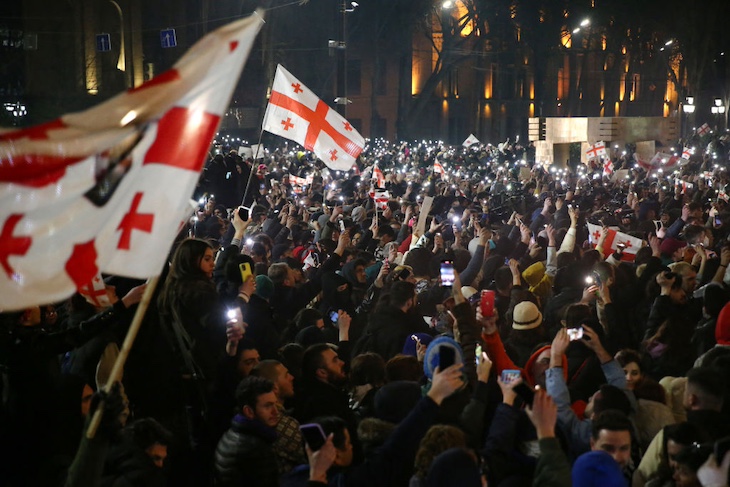The Georgian parliament has rammed through its new foreign agents law amid massive protests, overriding the veto of pro-western and pro-EU president Salome Zourabichvili. The new law essentially will require all non-commercial organisations operating in Georgia to register as foreign agents and publicise themselves as such if they receive over 20 per cent of their funding from abroad. Its aim is to counter the influence of pro-western NGOs in the country.
The Georgian government has a point when it defends the requirement of registration as a transparency measure
The proposal has already caused serious unrest, and this will undoubtedly now balloon. You can see why. The government led by ruling party Georgian Dream is not a pleasant grouping. It is far from libertarian and apt to suppressing dissent with some force. Also, even if not officially pro-Kremlin, it is certainly in favour of appeasing Moscow over Ukraine. Georgian Dream’s chairman and founder Bidzina Ivanishvili, an apparently paranoid billionaire with many Russian connections, alleges that there is a shadowy ‘global war party’ conspiring to force Georgia into war with Russia through influencing NGOs and other organisations within the country, and that something needs to be done.
Opposition to the law, and to the government as a whole, comes overwhelmingly from highly educated young people in Georgia who with good reason see the future of their country as European and west-facing rather than grimly and at times despotically Asiatic. The government also faces determined pressure from the EU, which has said it will endanger Georgia’s candidate status, and the US, which has gone as far as to impose personal sanctions on Georgian Dream leaders. And this is not to mention our own Foreign Office, where a couple of weeks ago the Minister of State Nusrat Ghani said the new law was ‘not in line with the democratic values of a Nato aspirant country.’
Before you join this chorus, you should nevertheless take a moment to think. You don’t have to like the Georgian regime to see that the arguments are by no means all one way.
To begin with, although the law is largely copied from a Russian template (it is nicknamed the ‘Russian law’ by opponents), and emanates from an authoritarian regime, it is difficult to see much wrong with the principle of it. To require pressure-groups and think-tanks operating in a state with substantial foreign funding to register and publicise their sources of support is not the same as preventing them operating. Nor is it particularly undemocratic to require such transparency: if anything, indeed, the reverse. True, the law is cack-handedly drafted, and strictly speaking would cover not only campaigning groups but artistic or scientific associations. But this is a relatively minor matter. The Georgian government has a point when it defends the requirement of registration as a transparency measure.
More to the point, demands from foreign governments and western commentators to scrap the new law leave the critics themselves worryingly open to charges of hypocrisy. This is for two reasons. One is that the objections are pretty obviously selective, and based on the fact that the NGOs and other organisations affected by the new legislation are all pro-European and pro-western. It is a racing certainty that none of this pressure would have been exerted had Russia, or China, set up front organisations in Tbilisi to call for alignment and co-operation with other authoritarian regimes in central and east Asia, and had then faced legislation from Tbilisi to curb those organisations’ activities.
Second, many of the western nations now seeking to tell Georgia how to run its affairs themselves have their own agent registration laws. The US, for example, passed its Foreign Agents Registration Act in 1938 to deal with Nazi and fascist propaganda, and it is still in force. Admittedly narrower than the Georgian one (for example, it excludes news organisations and a number of other bodies) its principle is similar. A number of European states such as Germany also have such provisions. Last year the UK introduced one fairly similar to the US model in Part 4 of the National Security Act 2023. And six months ago the EU, one of the most vociferous critics of the Georgian legislation, itself unveiled a wide-raging proposal for a directive, which if anything would be wider than the US provision (it would, for example, it seems include even foreign media organisations seeking to influence policy).
This is not to defend the Georgian government. Georgia is currently balanced on a knife-edge between western-style liberal democracy and authoritarianism. Indeed, the threat of the latter is strong, if only because Russian troops continue to occupy swathes of northern Georgia. This matters: it remains vital for the UK, the EU and the US to continue to put maximum pressure on the regime in Tbilisi and make it clear that they support those in Georgia who prefer a liberal western path to that chosen by Georgian Dream.
But the West needs to be honest about what it wants. There is no clear case against the foreign agents law: there is a very clear case indeed against the government that passed it. Continuing with an insistence that this law, approved by a government with at least some claim to democratic legitimacy, should be dumped, western governments are pressing a weak case instead of a strong one. By doing this they are not only being unwise: they are also arguably making a rod for their own backs in future, and inadvertently strengthening the hand of the would-be autocrats in Tbilisi.







Comments